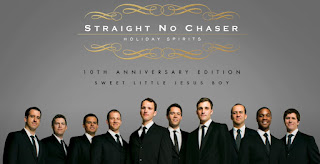Sweet Little Jesus Boy -
John 1:9-13, NIV - The true light that gives light
to everyone was coming into the world. He was in the world, and though the world was
made through him, the world did not recognize him. He came to that which was his own, but his own
did not receive him. Yet to all who did
receive him, to those who believed in his name, he gave the right to become
children of God— children born not of natural descent, nor of human decision or
a husband’s will, but born of God.
I have loved this song dearly since
I heard it in my church growing sung by a big man with a big bass voice. I, like most others, always thought it was an
African-American Slave spiritual passed down over the centuries. Imagine my surprise this year finding out it
was composed by a white composer named Robert MacGimsey in 1934. MacGimsey might be pleased at my (and others)
mistake because he wrote the song from the perspective of and African-American
slave and his original lyrics used 19th-Century African-American
dialects (ie..”we didn’t know who you was”).
MacGimsey grew up on a plantation
in the deep south of Louisiana that employed former slaves. His early faith and love for music was in
part fostered by those former slaves and their music. Here’s an excerpt from Rinna Rem nn her
Arizona State University Archive Project 2013 "Processing the Robert
MacGimsey Collection" :
“Robert MacGimsey was born in
Pineville, Louisiana. African American folk spirituals were embedded in his life
since birth. He grew up on a plantation and his parents employed African
Americans, many former slaves, for help in their house and on the farm.
MacGimsey’s nanny, whom he referred to as Aunt Becky, sang spirituals to him as
a baby. Many of the hired help on his family’s property became mentors of
Robert’s. They always taught him songs and he even attended Baptist church with
his “uncles” to participate in singing spirituals. Thus, his passion in life
was to learn, document, preserve, transcribe and make accessible to the public
African American folk spirituals from the American South.”
On Christmas Eve 1932, McGimsey
attended a midnight church service in New York City and was heading back to his
one-room apartment. On his walk, he passed by the open doors of private clubs
where people were shouting and swearing and singing. Others were so drunk they
had passed out on the sidewalk. They
were obviously oblivious to the holy nature of Christmas Eve.
After arriving home, he penned the
first draft of “Sweet Little Jesus Boy” on the back of an envelope. His vision for the song was an aging black
man whose life had been full of injustice “standing off in the middle of a
field just giving his heart to Jesus in the stillness.” His vision was achieved at least for me
because that has been my experience of the song. I never fail to feel how so often, I let
myself become disconnected from the core of our Christian faith. I get so busy with other distractions that
Jesus, although never completely forgotten, is no longer my primary focus. Despite my best efforts, I “forget” who Jesus
truly is. This song always brings me
back, usually with sorrowful tears.
Newer covers of this song have
updated the lyrics to reflect modern English and for a while, I wasn’t sure how
I felt about that. MacGimsey used the 19th
century dialects as a way of being faithful to his Aunt Becky and others. I would want to honor that. But I have read several modern-day commentaries
by Black authors who share that, while they too honor MacGimsey for his intent,
those lyrics now have taken on a different tone on the other side of the civil
rights movement. To them, the old language
feels too much like other songs which mimic the slave dialects, but for derogatory
purposes. Azizi Powell captures this
sentiment well for me:
“The main reason why I don't like
to hear Spirituals or any other songs in 19th century Negro dialect is because
that dialect reminds me of black-faced minstrel songs. Those minstrel songs are
heavy on Negro dialect and are full of highly offensive depictions of Black
people. I admit that hearing songs that include 19th century Negro
dialect-particularly when sung by non-Black people- makes me cringe.”
I respect and want to honor that position
as well. Because of that, I appreciate both
the original and updated versions of the lyrics. My link in this post is to one of my favorite
covers with updated lyrics.
Question: As you reflect
on this year’s Christmas season, are there ways in which you felt disconnected
from the heart of the season by the many distractions of our culture?
Prayer: The song
itself is the prayer for today
Prayer Focus: Pray
for those whom the world “has treated mean.”
Song: Sweet Little
Jesus Boy – Straight No Chaser

No comments:
Post a Comment